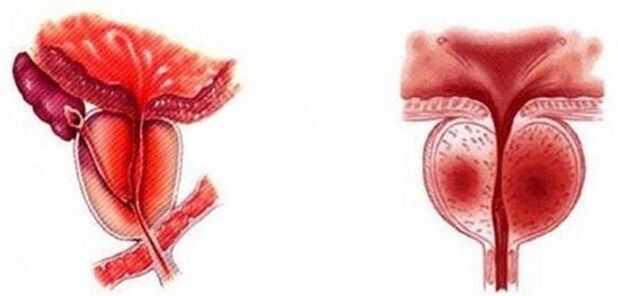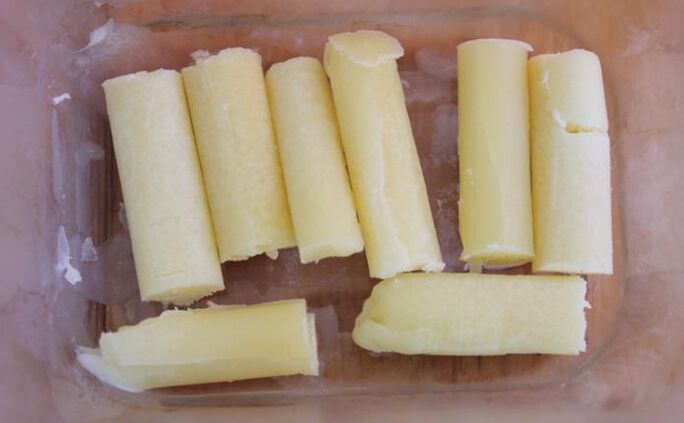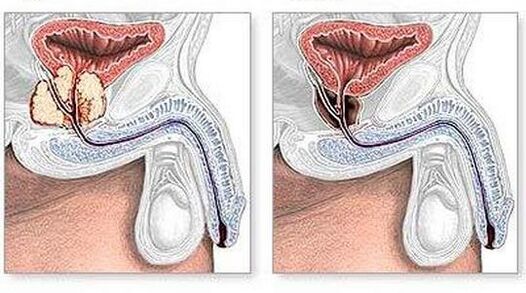
Chronic prostatitis (code N41.1 MKB-10) is called the inflammatory process, which is observed for more than three months in the prostate gland tissue.The way is in almost 70% of all cases, it continues without any symptoms.And only 15% of patients complain of disease manifestations.All other men have symptoms that only partially indicate the development of prostatitis and often contact other diseases.Therefore, it is very important when any signs occur to see a doctor who, after the examination, will tell you how to treat chronic prostatitis.
The peculiarity of the disease
Chronic prostatitis can diagnose not only in the elderly.Young and middle -aged people are also subject to the disease.At risk are those who live an inactive lifestyle, adhere to sexual abstinence or experience physical efforts in the perineum.That is, the probability of chronic prostatitis in the driver, the athlete is much higher than others.
Among all diseases of the male reproductive system, chronic prostatitis ranks first in prevalence, followed by cancer and hyperplasia of the DGPG prostate gland (prostate adenoma).About each third man facing prostate inflammation, and every fifth of them suffers from a chronic form of disease.
In most cases, the cause of chronic prostatitis is a disease transmitted from the genitourinary system caused by infection.Slightly less often, it is caused by the inflammation process associated with changes in a man's hormone background.
Classification
As well as other inflammation, chronic prostatitis can have acute and chronic stages.The classification is based on the following features:
- The presence of leukocytes in urine.
- The presence of pathogenic bacteria in urine, ejaculation or gland secret.
Based on the classification, the following types of diseases exist:
- Asymptomatic inflammatory prostatitis is characterized by a lack of symptoms of chronic prostatitis.It is possible to identify by chance when the patient deals with a doctor with other diseases.
- Acute bacterial prostatitis.Patients have acute inflammation of the prostate tissue, pathogens are present in the urine, leading to increased temperature and the development of body intoxication.
- Chronic bacterial prostatitis.Doctors note the typical signs of chronic inflammation.And in urine and secret analysis, high leukocyte and bacterial content is detected.
- Chronic pain syndrome in the pelvis.Such pain is considered a major symptom, as bacteria are not detected.To make a chronic prostatitis diagnosis, the syndrome should be observed in a man for at least 3 months.
Cause
The main causes of chronic prostatitis are pathogenic penetration (enterococci, intestine or prayer stick, etc.) into the prostate gland, etc.).Going to the prostate, bacteria can be in three ways:
- Through the urethra.
- Through blood.
- Through the lymph.
According to statistics, 90% of chronic prostatitis cases are the result of the development of acute prostatitis or complications of uretritis.
In addition to entering the bacterial prostate, the cause of chronic prostatitis can be as follows:
- Sexual infections (STPP): herpes, trichomonas, gonococcus, chlamydia, etc.
- The process of stagnation in the pelvic area, which can cause prostate inflammation.
- Reduces immunity.These can cause: vitamin deficiency, violation of hormone balance, hypothermia, allergic reactions, significant physical and emotional stress, non -infected infections, etc.
- An inactive lifestyle.
- Light weight.
- Sex life or irregular sexual harassment in intimate fields.
- Crotch injury.
- Wear a narrow linen.
- Irrational nutrition (dominance in a spicy diet).
- Layer to urinate.
- Chair violations.
All of these can cause blood circulation disorders in the pelvic area, contributing to unstable phenomena and the development of inflammation.The result of a lack of therapy is infertility and impotence.
Symptoms of disease
Signs of chronic prostatitis can be very different.Often, patients complain:
- Reduce performance.
- Fast fatigue.
- Increased irritation.
- Concern.
- Sleep violations.
- Fatigue.
- Losing appetite.
- Increased sweating.
Between local symptoms:
- Urinary tract.Patients feel frequent, pain at the beginning and end of the urine.
- Pain that can be given to the thighs, sacrum, scrotum, sub -lane bone or rectum.
- Ill for sex.
- Release on pelvic muscle tension.
Unlike acute phases, in chronic diseases, sexual function violations often occur.This is associated with the fact that stagnan is also a process of inflammation, affecting the ending of the nerves that give the pulse to the brain.As a result, erection violations are possible, which is weakening or ejaculation (premature ejaculation), the current sensation of orgasm (orgasm is eliminated).Symptoms of chronic prostatitis such as men cause fear, irritation, and as a result, sexual neurosis develops.
It is not easy to treat chronic prostatitis.How long to take the medication depends on the level of pathology and duration of disease progression.It is important to remember that if the symptoms of the disease have disappeared, this does not mean the final healing.Severe consequences of chronic prostatitis include gland scar.This process can turn to the urethra.
Diagnosis of a disease
When he goes to a doctor, he will ask the patient with the symptoms.Special attention is given to the frequency and nature of pain, urinary tract, sexual dysfunction.But due to the fact that chronic prostatitis can occur without any manifestations, certain studies are required:
- The analysis of clinical and bacterial urine in which the amount of leukocytes and the presence of pathogenic microorganisms are determined.
- Secret analysis that may contain bacteria.
- Binding from the mucosa where the amount of leukocytes is determined, the presence of macrophages and amyloid bodies.
- Transuretral ultrasound makes it possible to identify chronic prostatitis echobroblast and determine the prostate condition.
High quality diagnosis is a major part of the right treatment, as it allows to distinguish chronic prostatitis from other pathologies with the same signs.
Treatment
The disease should have an integrated approach to therapy.In this case, the patient needs to adjust to the long treatment.Chronic prostatitis treatment regimen will be individual for each patient.Usually, patients do not need hospitalization and they can be treated at home.The completely different thing is when the acute phase of the disease or its severity to the background of the prostate chronic inflammation is subject to treatment.In the hospital, antibacterial therapy is used and deintoxic is performed.If necessary, surgery is required.
Drug therapy
For comprehensive treatment of chronic prostatitis, medicines are prescribed in men, the effects are intended to eliminate infection, normalization of blood circulation and hormone levels.To do this, use:
- Antibiotics.
- Anti -inti -non -medicine.
- Anticolinergic agents.
- Immunomodulators.
- Angioprotectors.
- Vasodilative medicine.
Before making an appointment, the doctor will analyze the pathogen.If the disease is not the origin of the bacteria, then the course of antibiotic therapy will be short.In cases where it is not possible to determine the type of pathological microflora with a laboratory method, histological analysis of prostate tissue is used.
With the relapse of the disease, antibacterial therapy is prescribed for preventive purposes.For this, drugs are used, which have been used during treatment, but in lower doses.
Knowing what chronic prostatitis is and what can cause its development, the specialist will pay attention to the pressure in the prostate gland and its ability to reduce it.If this function is reduced, then unstable phenomena and prostate inflammation can occur in the pelvis.Alpha blockers are prescribed to normalize intrauterine pressure.
You can avoid painful injections and take pills using candles.
For quick and painful bladder complaints, non-steroidal anti-inflammatory drugs are used in conjunction with alpha barriers.
In cases when taking antibiotics appear to be ineffective and symptoms such as pain and diarrhea are preserved, treatment is adjusted so that it is directed on:
- The elimination of pain.To do this, use tricyclic antidepressants.
- Normalization of urine.Treatment is prescribed after urinodynamic analysis.With sphincter hyperactivity, antihistamines, trikic antidepressants and bladder eradication with antiseptic solutions are indicated.With ineffective such treatment, neuromodulation and physiotherapy are used.
Non -Drug methods
In order for the treatment with the tablet to be more effective, doctors may recommend physiotherapy (electrophoresis, phonophyesis, laser therapy, mud treatment) and transrectal hyperthermia, which is carried out taking into account changes in prostate tissue and related diseases.When exposed to 40 degrees, cellular immunity is activated.When exposed to a 45 degree temperature, nerve endings inhibition occur, which helps stop pain.The use of laser therapy has biostimulation effects.
In the absence of contraindications, the patient is performed by the prostate gland.Often patients are prescribed psychotherapy courses and special exercises that can strengthen the perineum muscles.
Treatment with folk medicine
Along with the use of medicines, chronic prostatitis manifestations are treated with folk methods.Such treatment improves immunity and reduces pain.For this, in addition to herbal preparations, herbs and decoctions of herbs, baths, and more -ly -use.
The course of treatment with phytopreparations is at least 1 month and should be prescribed by a doctor, as some of them may have contraindications to use.Treatment with folk methods suggests:
- Many drinks (tea with linden, rosehip, raspberries).
- Every day before meals, you need to drink 1 cup of carrot juice, pear, newly squeezed cucumbers.
- If the patient is tortured by pain, coniferous baths are used, temperatures 37 degrees.The duration of the procedure is 20 minutes.
- If the patient does not have allergies to honey, he or she is recommended to eat up to 100 grams of product daily.
- At home, you can freely make suppositories based on propolis or honey.You need to put it in 1 month.To prepare candles with propolis, take a mixture of glycerol, gelatin and water in a 5: 1: 2 proportion. Add propolis there and distribute the mixture on paper.Put everything in the fridge, where the suppository is true.
- Before bed, it is recommended to make enema with wormwood.To do this, 1 teaspoon of dried plants is mixed in 1 liter of boiling water.

Treatment with pumpkin seeds, aloe vera juice, parsley, chestnut and celandine is also considered effective.Parsley has an anti -inflammatory effect and can restore sexual function.Fitotherapists recommend this treatment with this plant:
- Drink 1 tablespoon of parsley juice daily before eating.
- 4 teaspoons of plant seeds pour 250 ml of boiling water and insist on the thermos for the night.The next day they drank 1 tablespoon an hour.
- 100 g of crushed plant root is poured with 1 liter of water, put on low heat and boil for 10 minutes.Stewed drunk during the day.
An effective tool is pumpkin seeds.About 30 of these seeds contain daily zinc doses, which are required for men's health.For treatment, you can create such a tool.500 g of pumpkin seeds are crushed in meat grinder and mixed with 200 grams of natural honey.The ball is made from the resulting mass, walnut size.Every day you need to eat those 2 balls.
Propolis helps strengthen the body's defense and relieve inflammation.You can buy a tincture at a pharmacy.For treatment, you need to drink a glass of milk daily with 1 teaspoon of tincture.
In addition, Decoctions Licorice, Wort St.John, echinacea is used for treatment, which is also used in cases where the disease occurs without obvious symptoms.
Surgical
Often, chronic prostatitis does not provide symptoms, and patients seek medical help when serious changes in the prostate gland have occurred and chronic prostatitis is helpless.In addition, such complications can pose a threat to the patient's health.Examples of complications can be called prostate sclerosis.
Because such complications are often lowered in young men, doctors use slightly invasive surgery.Indications for its use are: phimosis, voluntary urine emission, or, on the contrary, delay, prostate abscess, significant increase in glands in size, uretral blockade or bleeding.There is a type of surgical intervention shown for chronic inflammation:
- Circumcia - used when the patient has fimosis.During surgery, the fork is opened.
- Prostateectomy is a radical operation in which the prostate is completely removed.It is carried out if suspected of the presence of malignant tumors.
- Prostate resection is a partial removal of the gland, in the case of its sclerotic changes.
- Removal of adhesion.
- Drainage of cyst or abscesses.It is produced by endoscopy.For drainage, a special tube with the camera at the end is used.Such devices are introduced into the lumen of the urethra and enable it to control operating courses.
- In the case of various complaints of sexual disorders (infringement of orgasm, painful ejaculation, etc.), the patient is carried out by an erystarmal channel.

The results of the surgical intervention will depend on the timing of the diagnosis.In cases where there is a prostate adenoma, the manifestation of chronic prostatitis can be lubricated.This is observed in 70% of cases.25% of men learn about the development of chronic prostatitis during adenoma examination.And only 5 % of patients - during preventive examination.
The condition for surgery is a lack of effects with the conservative treatment of the disease.Therefore, surgery is required to prevent complications and improve the quality of life.
However, it should be noted that even after surgery it is possible to restore prostatitis.This happens in almost half of the handling.Contraindication for any operation is:
- Diabetes.
- Liver pathology.
- Respiratory system disease.
- Mental disorders.
- Heart disease.
The prognosis of the disease
Everyone who is facing such a diagnosis is interested in whether chronic prostatitis can be cured?The disease is considered to be cured if the symptoms do not appear significant periods, the level of leukocytes in the urine is normal, in the secret of the prostate no pathogenic bacteria, urine and sexual function are restored.
Often, prognosis is good in cases where the disease does not lead to irreversible processes, and the patient observes the treatment prescribed to it.
Prevention
Every middle man should prevent the prevention of genitourinary system diseases, which will also help reduce the likelihood of chronic prostatitis.Enough for this:
- Adhere to a healthy lifestyle, play sports.
- Eat right.It is important to consume a lot of protein foods (low fat meat and fish, dairy products, eggs) and limit the amount of animal fat.At the same time, canned foods, sharp dishes, salts, alcohol should be excluded from the menu.
- Normal sex life.It is important to avoid unprotected sex.
To prevent prostate disease, every man, especially after 35 years, must monitor his health and live an active life.There is no need to ignore medical examinations, which always helps identify prostatitis in time and begin treatment.It is important to remember that it is cured if it is detected in the early stages, and the patient observes all the doctor's prescription.























